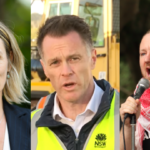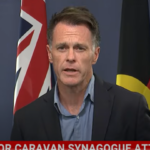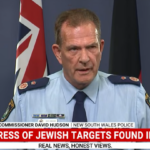NSW’s Illegitimate Hate and Protest Laws Are Creating Social Division, Says NSWCCL President Timothy Roberts
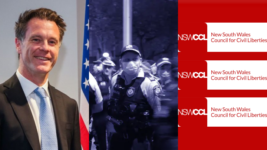
A caravan filled with explosives and a note listing Jewish premises around Sydney was located on a property on Dharug land in the semirural suburb of Dural on 19 January, and following information related to the discovery of it being leaked to the press on 29 January, NSW premier Chris Minns told reporters that there was “only one way of calling it out and that is terrorism”.
But during the same presser, NSW police commissioner David Hudson expressed doubts about the legitimacy of the crime, which came on the back of a series of other so-called antisemitic crimes across Greater Sydney over last summer. And the officer further said the following day that the caravan may be a “setup”, and suspects related to the other crimes weren’t motivated by ideology.
The Minns government then went on to pass a series of three bills over 20 and 21 February, which restrict protests near places of worship, created new racial and religious hatred offences as well as crimes related to the incitement of racial hatred. And numerous MPs criticised the hurried manner in which these laws were passed, including suggesting that they’d been “bullied” through.
The AFP then held a 10 March press conference revealing that the caravan and all the other major antisemitic crimes over the 2024/25 summer were the result of a “fabricated terror plot”, which involved organised crime creating the idea that the city was under threat of violent antisemites out to get the Jewish community, so they had a bargaining chip with police regarding a prison sentence.
This sparked questions about whether NSW premier Chris Minns and police minister Yasmine Catley were privy to the doubts police had about the legitimacy of the crimes, when passing the new rights-eroding criminal offences predicated upon the incidents that were part of a “criminal con job”, especially as Hudson had raised doubts publicly on 29 January.
An inquiry into what was known about the fraudulent nature of the crimes at the time of passing the legislation got underway in April. On first hearing, it was established that Hudson had informed Minns and Catley “very early on” about his doubts as to the legitimacy of the incidents. But the ministers have refused to testify, while their staff who have basically divulged nothing.
Sydney Criminal Lawyers spoke to NSW Council for Civil Liberties president Timothy Roberts about what the evidence from the inquiry currently indicates regarding the awareness of the premier and police minister, how the laws Minns oversaw the passing of are creating social division in the community, and why the measures need to be repealed.
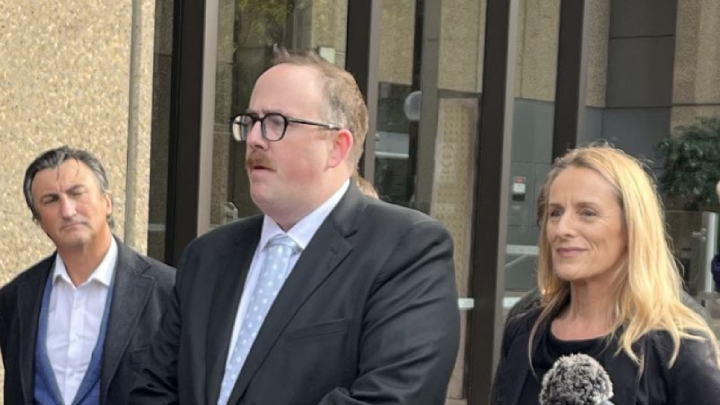
Tim, at one point during the latest hearing of the NSW parliamentary inquiry into the Dural caravan fiasco last Friday, inquiry chair Independent MLC Rod Roberts asked Minn’s media chief a question, and Labor MLC Emily Suvaal remarked it would be better directed to the premier.
However, Minns had confirmed to 2GB just days earlier that he would not be appearing before the inquiry.
The NSWCCL has been critical of the premier’s refusal to front up to the inquiry from the get-go. So, overall, how do you consider the inquiry? What do you think of the premiers’ form in respect of it? And how would you say NSW police dealt with responding to it?
Our criticism starts with the premier. His refusal not to appear is something he can do under law, and he is in essence using the power and privilege afforded to him as a minister and a member of the lower house to refuse.
But what he doesn’t do in doing that is add to the transparency that this situation requires to restore the faith of the NSW public in our democracy and our democratic institutions.
The evidence seems to indicate that Minns and Catley knew very early on that the police were considering that there was much more than a mass casualty event or a potential act of terrorism at play, as there were other considerations the police were then looking into.
At some of the meetings between ministers and police, staffers didn’t take notes, and from there, we had the premier making very broad statements about what he had been told, and what they understood the situation to be.
This is to say that Minns, potentially, misled parliament and the public about what they knew about what the event was or what the police were considering the situation was.
That goes completely against what is required of the executive of our government, that being the ministers, in sharing information with the legislator, when laws are being passed, so they are, therefore, fully informed. And it also creates a sense of panic in the community as well.
We don’t fault that he has the power not to turn up to the inquiry, but the NSW premier in not turning up is essentially relying on those powers to avoid scrutiny and to avoid adding transparency to the situation and restoring faith in our democracy.
In so far as how the police have participated, from what we can see they did their job. There is a concern around why they couldn’t release more information about what they were doing and working with in the federal office, the federal police.
But in circumstances where the police are doing their job, our criticism is not towards them, it is to the premier not allowing them to just do their job.
Minns created a sense of fear and panic in the community that wasn’t beneficial, and then the legislators used that information to pass laws that unfairly and improperly took away our civil rights and our liberties.
The premier also used that information to create a sense of urgency to the laws and then moved procedural rules that suspended protections around parliament in terms of debate and getting information before legislation was passed.
Minns used those procedural powers to essentially ram through this legislation in a very quick period.
So, the legislators were really relying on the executive and the information they were being provided in passing the laws in the forms that they did, and that is not good enough in terms of what we expect our government to do in protecting us.
The Minns government passed three bills through parliament over 20 and 21 February. The bill that created an offence of obstructing places of worship and provided police with a power to move on demonstrators protesting near a place of worship is currently being challenged in the NSW Supreme Court.
The NSWCCL has been supporting the challenge. Some people have suggested that the ultimate goal of this bill is to provide the authorities with the ability to shut down protests right across Sydney city.
Tim, you’re a lawyer who primarily provides legal services to unions and workers, so what is your take on these antiprotest laws?
Our take on these protest laws is that they are specifically targeted at how to respond to specific protest movements, like those related to Palestine and more broadly, given the track history of this government, the climate change movement as well.
But these laws are so poorly drafted and so broad that they don’t capture either specifically those movements or just protests, as they relate to any assembly in proximity to a place of worship.
Because of their drafting they potentially shutdown protest or assembly with regard to great swathes of the city, because, as people who have seen the city of Sydney know, there is a religious institution on nearly every corner.
While there are some protections for protests near parliament, there are none for institutions like the Town Hall, where we have rallied in protection of Medicare and the Yes campaign for marriage equality.
Indeed, any of these campaigns that we would look back on now as a community and think with joy that we might have been a part of and that we are glad happened, all of them have been banned because of the breadths of these laws.
Now, we cannot even assemble right next to Town Hall without authorisation, because we risk arrest and move on powers due to an Anglican cathedral across the way.
These laws are so broad and so poorly drafted that they are clearly an attempt to shut down specific protests, but actually, shut down all our political assemblies and our ability to communicate, and it is a shame on our government for moving that way.
So, you don’t have to seek authorisation to hold a protest at Town Hall usually, unless you are planning to march on the streets afterwards, but now this has changed?
The NSW police continually run a line to there being something called ‘authorised protests’ as opposed to ‘unauthorised protests’. The truth is there is no such thing.
We have a democratic right to assemble and communicate politically, and we have a right, therefore, to protest. We do not need the NSW police commissioner’s permission to do that in any context.
But what these laws do is create such a notion. The idea is that if we want to protest in these locations, we now have to complete a Form 1 for it to be authorised, but we shouldn’t have to do that.
That is not how our law works. We have a right to assemble, and it is very dangerous when we have the police using their discretion to shut down protests that they consider valuable or not.
So, in circumstances where previously we could have filed in a Form 1, when we didn’t have to, now if we do want to protest, there is a question about whether or not we could protest, in terms of when inviting the police along to potentially arrest us and move us on for any social movement.
The other two bills involved one that focused on racial and religious hatred and another containing measures against the incitement of racial hatred.
I noticed that after the AFP announced the entire “antisemitic” crimewave across Greater Sydney, including the Dural caravan incident, were a “criminal con job” that you called for the repealing in particular of the places of worship bill and the inciting racial hatred bill.
So, what are your thoughts on these two pieces of hate crime legislation having been passed, during the climate of fear around the ongoing so-called antisemitic crimewave? And why did you call out the incitement of hatred laws in particular?
The incitement of hatred laws suffer from some of the same issues as the protest laws. These laws are far too broad, and they go against the advice of learned institutions, like the NSW Law Reform Commission, which said they were completely unnecessary.
But more than that, these laws are damaging to our discourse and the right of political communication.
So, these bills introduced into law what are very subjective notions of what is hate, what hate speech is and how people perceive particular speech, so they’re inappropriate and invite the police into conversations that, as a community, we should be able to have without fear of retribution from the state or the police.
We called for those repeals and ones specific to the law regarding places of worship, because they, in our view, divide our community, as opposed to uniting it, and, ultimately, because you can’t police your way to social cohesion.
So, the more the Minns government tries to look strong in the media and move crimes that shut down our assemblies and the way that we communicate with each other, the more they actually introduce division into our community.
By way of example, the third bill you are referring to is one that relates to graffiti being on a particular place, essentially a synagogue or a Jewish premises, like a school, but this law already existed in terms of the symbols being banned, like swastikas. So, there was already a ban on these symbols being used anywhere.
So, this bill introduced a law that only protects the Jewish community and those buildings from this particular graffiti.
But when I was teaching as a public school teacher in the town of Griffith, out west, I remember with distress that the Sikh temple had a swastika painted on its wall.
Now, the question arises that even though the town rallied around that Sikh temple and condemned the use of the swastika, why is it that the Minns government thinks that the people that might be in a synagogue are worthy of more protection than those in the Sikh temple.
We point out that there were laws already on the books that protect each of those places of worship equally, while the new laws are biased or partial in the way they are applied.
That, if you are a member of the Sikh community, and I don’t speak for them, but if I was a part of that community, I think I would be likely concerned that this government doesn’t seek to protect me. It only protects one group not another.
That is adding division. It is not uniting us. It is a great example of why the criminal law, or the laws relating to hate speech, are not a place for police to be resolving divisions, because it is a place that we as a community must react to.
The incident in Griffith is a great example of where the community’s reaction, given the beautiful relationship the Sikh community has with the broader community in Griffith, is how these issues should be resolved, rather than having the police intervene through those specific laws.
A point Minns’ chief of staff raised a number of times during the inquiry hearing is that he considers the linking of the Dural caravan incident with the passage of the bills problematic, as some of the laws were being drafted as early as December.
However, NSW attorney general Michael Daley did say during his second reading speech relating to the incitement of racial hatred bill that the laws were a response to “recent incidents of antisemitic behaviour” in Sydney.
So, do you consider the assertion that there is a link between the passing of these laws and the Dural caravan or the other so-called antisemitic crimes over the summer is a fair assessment to have been made? How do you consider the laws and the crimes are linked?
These laws are connected because the Minns government has made it clear they are connected. The caravan incident was framed as an event that was capable of casting terror into the Jewish community. It was clearly a part of the broader collection of so-called antisemitic events.
It was also part of a great chain of what seems to be a criminal hoax of creating antisemitic events and incidents to strike fear to a certain degree.
We say they are linked, because they clearly are.
While the Minns government is facing increasing amounts of criticism, they can’t now try to rewrite history as to the reasons why they pushed through these laws, and to the general environment they did it in.
The public and the legislator was informed of these laws being necessary in the context of this terror event, and what was happening regarding the so-called antisemitic crimewave events.
So, whatever you may think of it, in passing legislation, we need to be very careful and take into consideration how everyone may be impacted by them.
What Minns is continuing to do is pass legislation based on comments he has made on the run in the media. If they had taken but a moment to consider them, they wouldn’t face the criticisms about which specific events these particular laws are linked into.
If they had taken more time as a responsible government would have, they could have made clear to the public, that if it was not the caravan terror event that resulted in them, which it seems to be from what we can see.
The same can be said about the feedback from the community. If they were interested in responsible government, they would have heard from the community about why these laws are not necessary and how they are poorly drafted, instead of pushing them through in such a way that we now have to live with the consequences.
These consequences potentially include the injury of a protester over the weekend, which saw police intervening in an event that in part saw the use of these laws.
And lastly, Tim, you’ve called for the repeal of the bills enacted in the wake of the Dural caravan incident as they were passed on the understanding that the entire antisemitic crimewave was legitimate: that is how it was publicly presented.
Underlying your calls is the suggestion that the Minns government passed these laws due to the antisemitic crimewave despite understanding that it was potentially a hoax, which further suggests that NSW Labor was simply keen to get these laws on the books regardless.
So, why do you consider that the Minns government wanted these laws enacted even if the crimes that suggested they were needed turned out to be fake? Why does a premier like Minns want these types of rights-eroding laws on the books?
In my view, the premier appears to have wanted these laws on the books, so he could seem strong to the Jewish community in doing what he needed to do.
What the Jewish community and the rest of the community needed was responsible leadership and not one that responded in panic to what was concerning information.
If the police were left to do their jobs, we wouldn’t have had the sense of stress that Minns introduced into the discourse or a bunch of laws that now erode our civil rights.
So, we call for their repeal because they are based on a hoax. They clearly infringe upon our human rights, and they were generally not necessary.
Beyond that we call for their repeal because there is no legitimate purpose. If you are infringing on our human rights, and that will happen because there are always competing rights, you must have a legitimate purpose for doing so. This is something that international law requires.
Not only is there no legitimate purpose on the basis that Minns said these laws were needed, but the apparent context that he created to push them through, was also not legitimate.
So, being there is no basis and no legitimate purpose, and given they infringe improperly upon our human rights, they have to be repealed.
If they are not repealed the divisions they create in our community, will only grow and get stronger and that’s a real danger.



